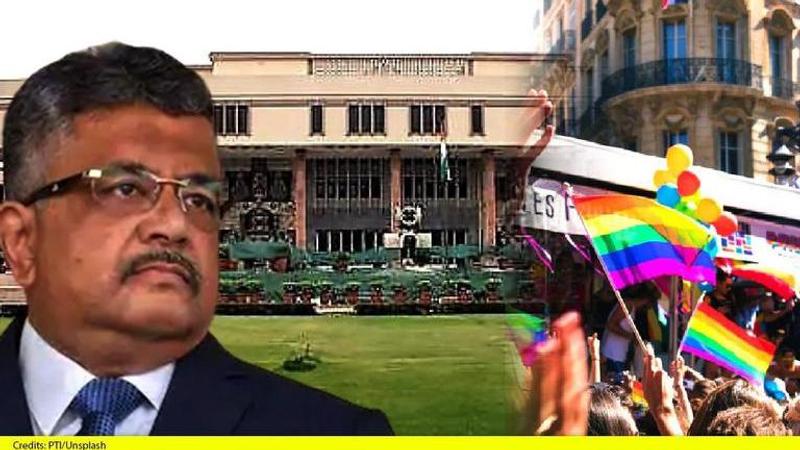Published 13:34 IST, September 14th 2020
Delhi HC hears PIL for same-sex marriages; Centre to put official stand on record soon
The Delhi High Court on Monday heard a PIL seeking recognition of same-sex marriages under the Hindu Marriages Act, 1956

The Delhi High Court on Monday heard a PIL seeking recognition of same-sex marriages under the Hindu Marriages Act, 1956. During the proceedings, Solicitor-General Tushar Mehta, representing the Centre, stated that as per his legal opinion, the recognition of same-sex marriages under the Act would be contrary to prevailing laws. SG Mehta added, however, that while he was of the aforementioned legal opinion, the Centre's official stand will be put on record before the court soon.
Arguments in Court
During the proceedings in the court, the bench comprising Chief Justice DN Patel and Justice Prateek Jalan expressed that such a petition must be viewed with an open mind. Acknowledging that the position of the law might be different, the Bench stated that "changes are happening across the world."
SG Tushar Mehta, however, maintained that the effect of Supreme Court's 2018 judgment in Navtej Singh Johar's case was only to decriminalize consensual homosexual activities, "nothing more, nothing less". SG Tushar Mehta argued that it was a question of law for which he will file a note before the court.
He added that while he did not have instructions from Central government, he was pointing out legal provisions to show that law does not permit same-sex marriages. For permitting that, the court will have to change various statutory provisions.
Culture of any country is codified in a statutory law like Degrees of Prohibited relationship, special or additional rights to "wife", different age limits for "husband" and "wife", use of the terms "husband" and "wife", special protection to "wife" in criminal law e.g. Sc.498-A IPC etc, which cannot be determined in same-sex marriage. Unless several statutory provisions are altered, the relief as prayed for cannot be granted argued to SG Mehta.
The Court went on to suggest that the petitioners, who are activists and members of the LGBTQ community, could first try and get their marriage registered and if in case they were denied, could approach the Court with their grievance. Advocate Raghav Awasthi, appearing on behalf of the petitioners informed Court that there have been instances of gay couples getting married but being refused registration.
The Court thus asked the petitioners to bring on record all those persons who are aggrieved by the non-registration of same-sex marriages on the next date of hearing and slated the matter for further hearing on October 21.
What does the PIL say?
According to the details of the PIL filed on September 8, the petitioners have highlighted that Section 5 of the Hindu Marriage Act of 1956 does not distinguish between homosexual and heterosexual couples, asking the court to recognize same-sex couples under the said provisions of the Act. The petitioners have also argued that homosexual couples in India were being treated as 'second-class citizens' since they were not enjoying the same benefits enjoyed by the Heterosexual married couples.
Advocates Raghav Awasthi and Mukesh Sharma in their plea argued that there were no provisions under the Hindu Marriage Act, 1956 that mandated that marriage should take place only between a Hindu man and a Hindu woman, adding that Section 5 of the Act clearly lays down that marriage can be performed between 'any two Hindus'.
"It is further submitted that despite the fact that there is absolutely no statutory bar under the Hindu Marriage Act of 1955 and the Special Marriage Act of 1956 against gay marriage, the same are not being registered throughout the country and also in Delhi," the plea said. "As a result of the same, there are many benefits that would otherwise be available to heterosexual married couples that are not available to them," it added.
Pointing out that Right to Marry is a part of the Right to Life under Article 21 of The Constitution of India, the PIL argued that the prohibition of the marriage of LGBT people on the basis of sexual orientation and gender identity was 'absolute discrimination towards them'. "That Right to Marry is also stated under Human Rights Charter within the meaning of the right to start a family. The Right to Marry is a universal right and it is available to everyone irrespective of their sexual orientation and gender identity," the plea contended.
Updated 15:12 IST, September 14th 2020




